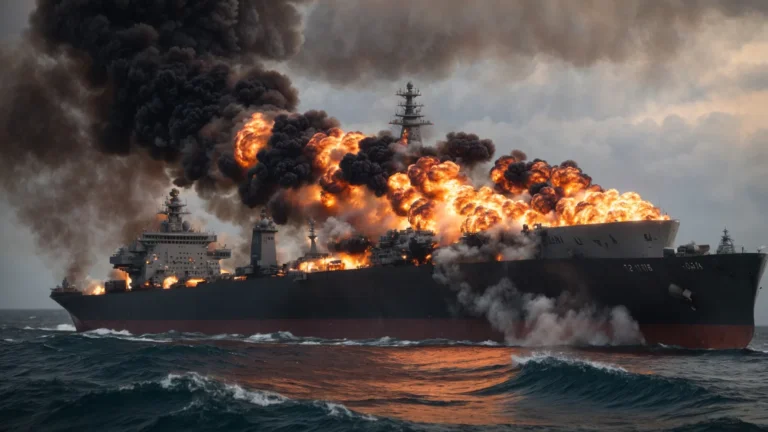Maritime Legal Implications of Houthi Red Sea Attacks on Global Trade
Recent escalations in Houthi maritime aggression have sent ripples across the intricate networks of international trade, posing substantial threats to the arteries of commerce that the global economy depends upon. These deliberate attacks target the vessels navigating the already volatile waters near the Middle East, intensifying the need for robust security measures and igniting debate over the adequacy of existing legal frameworks in international trade, including gains from trade and the United Nations Conference on Trade and Development. The reverberations are felt not just in disrupted shipping operations but also through the delicate balance of economic growth and policy among trading nations. With the specter of increased insurance premiums, realigned supply chains, and escalated military presence, these attacks present a complex challenge to the harmony of international commerce. Keep reading to understand the Houthis’ Maritime Legal Impact and the strategies being formulated to ensure the safe passage of goods and services in these treacherous seas.
Key Takeaways on Houthi Maritime Legal Impact
- Houthi Maritime Attacks Disrupt Crucial International Shipping Routes, Affecting Global Trade
- International Collaboration and Legal Response Are Vital to Secure Maritime Arteries and Uphold Law
- Rising Insurance Costs and Rerouting of Ships Due to Threats Increase Global Shipping Expenses
- Technological Innovations and Intelligence Sharing Play Key Roles in Enhancing Maritime Security
- Diplomatic Efforts and Regional Security Initiatives Are Essential to Address the Source of Conflicts
Overview of Houthi Maritime Attacks and Global Concerns
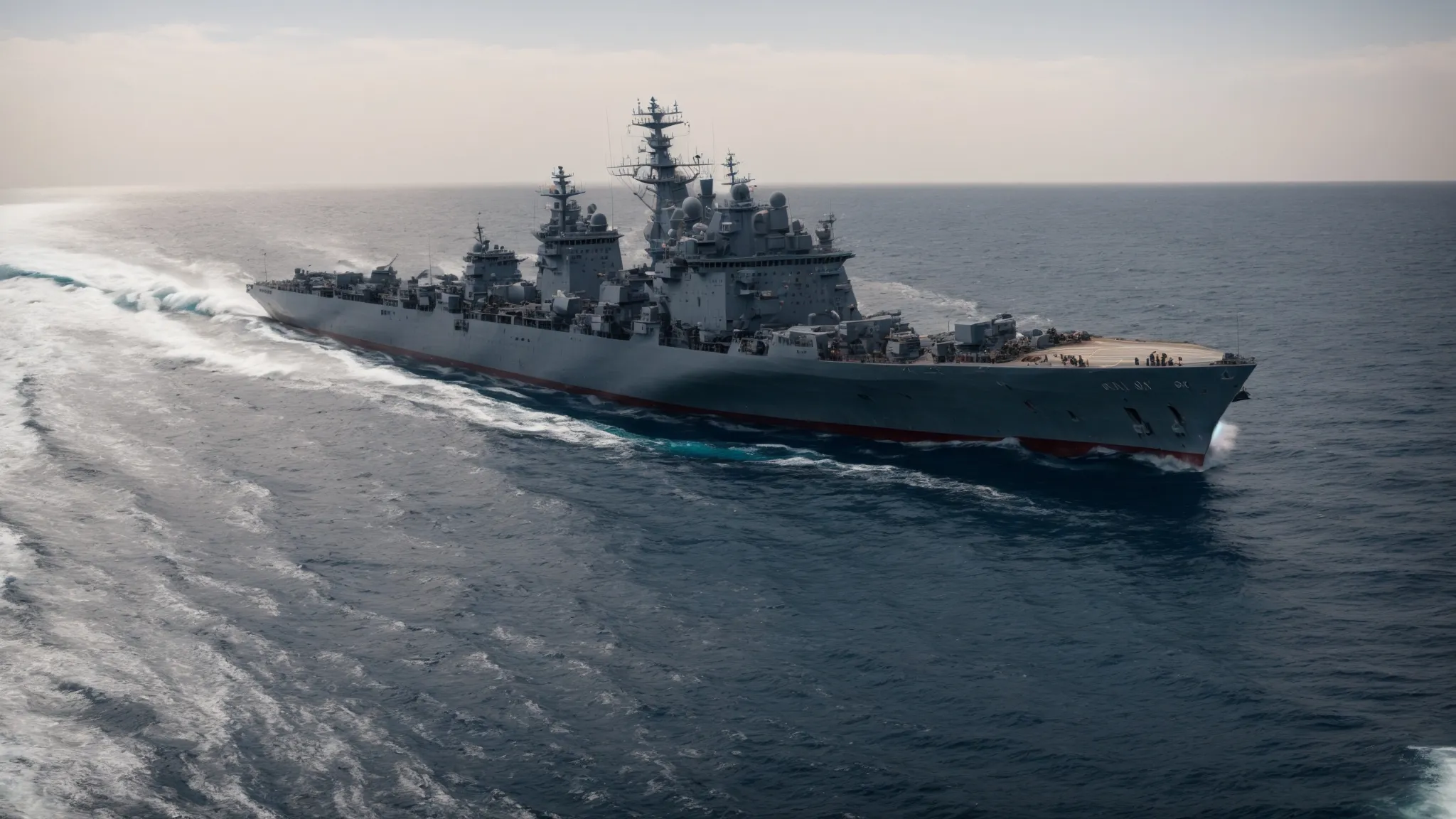
In recent times, the stability of international trade has faced perilous challenges due to a series of Houthi maritime attacks, drawing global attention to the delicate balance of safety and accessibility on crucial shipping routes.
This brewing cauldron of aggression has jeopardized the passage of goods and commodities through the strategic Red Sea corridor and summoned an array of international responses, seeking to uphold the sanctity of maritime law and international trade continuity.
As stakeholders from multinational corporations to nation-states express their consternation, there is a palpable urgency to scrutinize these disruptions, comprehend their wider implications, and reinforce an international framework capable of navigating and deterring such threats to economic growth and global cooperation in international trade. The World Trade Organization plays a vital role in fostering free trade and resolving bilateral trade disputes among nations.
Identifying Key Houthi-Linked Incidents at Sea
A critical analysis of Houthi-linked maritime incidents reveals a pattern of deliberate obstructions targeting the free flow of international commerce. These strategically executed strikes, exploiting key transit points such as the Bab el-Mandeb Strait, pose a direct menace to maritime vessels, threatening the livelihoods of countries reliant on these pivotal sea lanes for trade and sustenance.
Incidents like the targeting of the Saudi-owned oil tanker near the port of Hodeidah and subsequent skirmishes underscore an urgent need for heightened maritime security:
- Analysis of direct hits on commercial vessels navigating near Yemen’s coastline.
- Review of recurring drone boat attacks and the implications for regional shipping lines.
- Inspection of mines lurking beneath the waves aimed to sever crucial import and export arteries.
Such disruptions have far-reaching repercussions, compelling an essential partnership between governments and the private sector to ensure safe transit for personnel, goods, and energy resources.
The Strategic Significance of the Red Sea Shipping Route
The Red Sea, a crucial artery for global commerce, connects the Middle East to the bustling ports of the European Union and beyond. Its waters serve as a transit route for a substantial fraction of the world’s maritime trade, amplifying its significance as a strategic economic lifeline. The United States International Trade Commission closely monitors the impact of tariffs on this trade route, ensuring fair and competitive practices.
With the constant threat of Houthi acts of aggression in this region, the uninterrupted flow of goods—including oil and essential commodities—is at stake, which could trigger supply chain disruptions and economic tremors felt around the globe. These events could impact bilateral trade gains from trade.
- Evaluating the implications of disrupted oil shipments on the stability of global energy markets.
- Understanding the risk to merchant vessels and implications for shipping insurance and costs.
- Assessing the potential for heightened military presence to ensure the security of this vital trade route.
Thus, the importance of the Red Sea shipping route is underscored by its volume of traffic and vulnerability to geopolitical conflicts, highlighting the intersection of international trade and security. The United States International Trade Commission plays a key role in shaping trade policy and promoting fair trade practices and gains from trade.
International Responses to Maritime Threats
In response to the surge in Houthi maritime offenses, capable of strangling the lifeline of international commerce, the international community has taken decisive steps. Entities like the United Nations and the World Trade Organization, along with individual nation-states, are collaborating to enforce maritime law and protect the sanctity of trade routes.
Heightened collaborative efforts underscore retaliatory measures with a focus on deterring future maritime threats. Strategic deployment of naval escorts and increased surveillance around vulnerable waterways by countries invested in the safety of their vessels and cargo have marked an assertive international stance on this pressing issue.
Direct Effects of Houthi Attacks on Shipping Operations
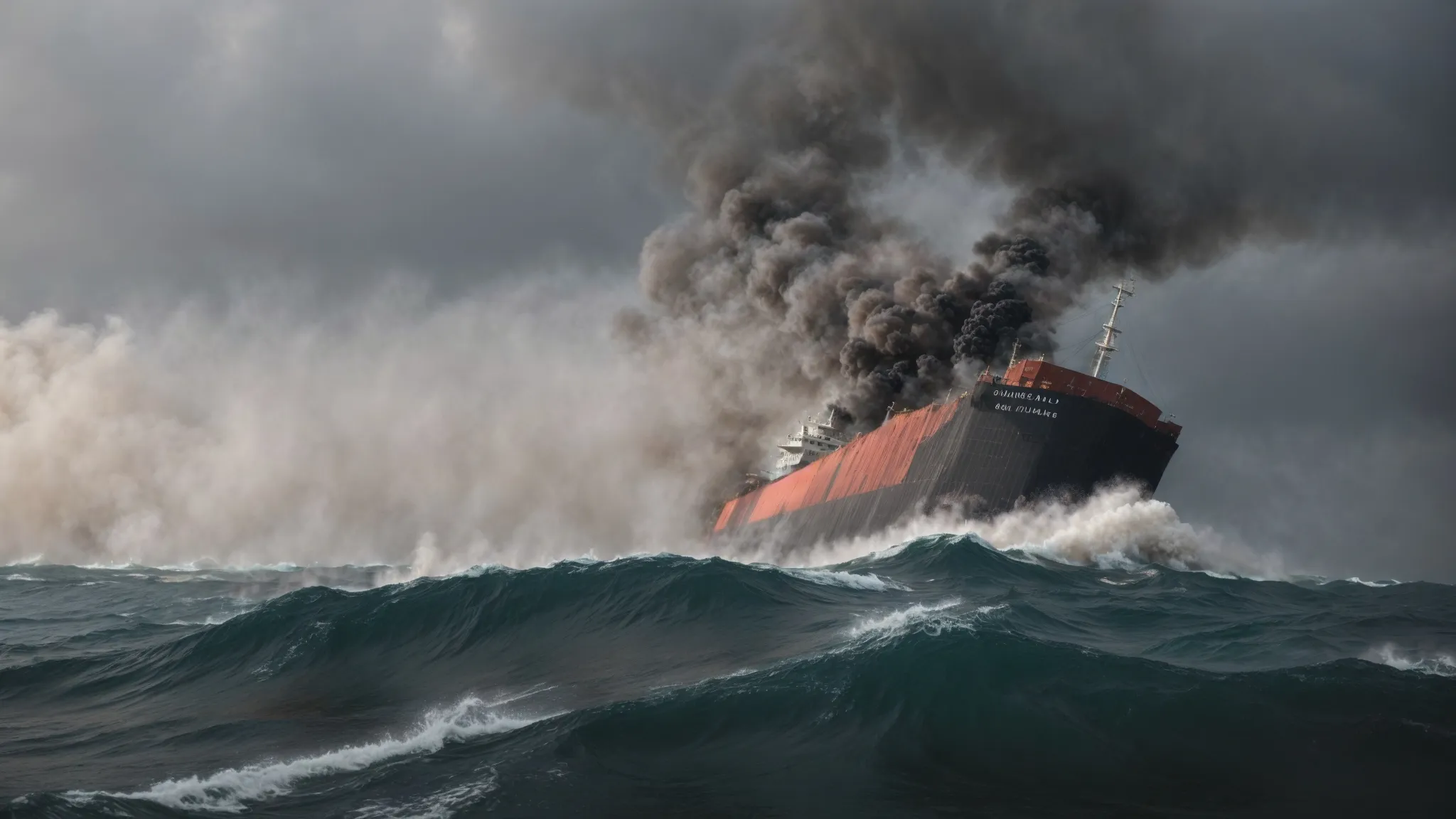
In the intricate ballet of global commerce where ships pirouette gracefully through international waters, crafty Houthi maritime offensives have thrust the performance into disarray.
These hostile maneuvers target the arteries of commerce, leading to the constriction of key shipping lanes which are the lifelines connecting disparate markets.
Notably, vessel seizures and acts of maritime sabotage instigated by Houthi forces precipitate a dual shockwave through the maritime industry—first by the immediate physical disruption of trade routes and second by the seismic reverberations felt within the nexus of insurance and gains from trade shipping overheads.
As experts pore over recent case studies to understand this burgeoning threat, the ramifications of such attacks become glaringly apparent, spotlighting the vulnerabilities of maritime security in a world grappling with restless tides of conflict. The United States International Trade Commission plays a crucial role in analyzing the impacts of tariff s, trade agreement s, and intellectual property issues on global trade.
Disruption of Key Shipping Lanes
Strategically mounted Houthi attacks have cast a shadow over the smooth operations of shipping lanes that are instrumental for international trade. The disruptive acts, slicing through the marine trade’s fabric, infringe upon freedom of navigation rights and threaten the passage of vessels bearing goods, thereby rattling the foundations of global supply chains. Import of goods
The breach in maritime security extends beyond the immediate peril, prompting reassessment of route viability and necessitating costly deviations. The Houthi disruptions draw a line of concern for shippers and governments alike, as each blockade or detour erodes the efficiency and predictability that underpin the global trade system:
| Incident | Date | Strategic Location Affected | Impact on Trade Flow |
|---|---|---|---|
| Oil Tanker Seizure | YYYY-MM-DD | Red Sea | Significant delay in oil delivery and heightened shipping costs |
| Drone Attack on Merchant Ship | YYYY-MM-DD | Bab el-Mandeb Strait | Forced rerouting and increased security measures |
| Naval Mine Detonation | YYYY-MM-DD | Gulf of Aden | Disruption of imports/exports and escalated insurance premiums |
Impact on Insurance and Shipping Costs
The ripple effects of Houthi attacks magnify as they inexorably swell the premiums for shipping insurance. Underwriters, faced with the mounting unpredictability of maritime adventures near conflict-ridden zones, recalibrate the cost of policies, factoring in the surge of risks that these aggressive endeavors entail. The United States International Trade Commission closely monitors the impact on international trade and bilateral trade.
Consequently, the upward climb in insurance rates catalyzes an uptick in overall shipping costs, a financial burden that eventually spills over to consumers. This surge underscores the burgeoning liabilities that global trade entities must grapple with in an era where maritime security is under siege by such hostile forces.
Case Studies: Vessel Seizures and Maritime Sabotage
In a climate where merchant vessels are increasingly targeted, the case of the MV Swift, apprehended by Houthi forces, serves as a sobering benchmark. This incident, occurring near the strategic chokepoint of the Bab el-Mandeb Strait, offers valuable insights for assessing the impact of such hostile acts on maritime legalities and international trade protocols. Foreign direct investment plays a crucial role in this context.
- Examination of MV Swift’s capture highlights the legal quandaries faced under international maritime law.
- Insights from the seizure present ramifications for future commercial vessel protection strategies.
Subsequent acts of maritime sabotage, including the crippling of a commercial diver support vessel, underscore the nuanced challenges to implementing maritime law when confronted with non-state actors. This case amplifies the complications inherent in international jurisprudence where conventional legal frameworks grapple with asymmetric threats in the context of foreign trade policy.
Broader Impact on Global Trade Dynamics
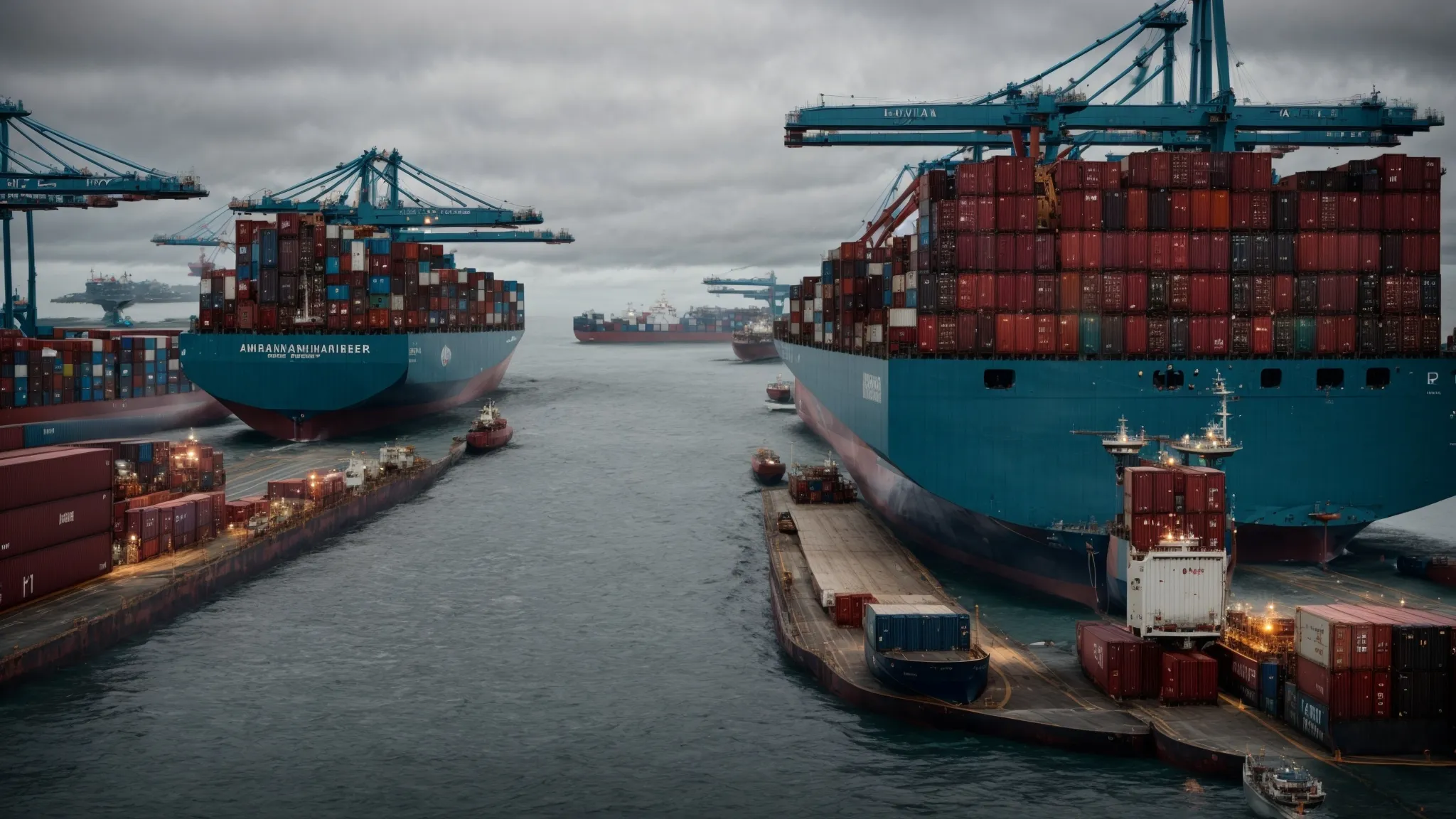
As the global community contends with the escalating Houthi maritime attacks, the ripple effects extend far beyond the initial flashpoints of violence, reaching deep into the intricate networks of commodity supply chains.
The specter of disruption looms large, prompting industry leaders and policymakers to confront the tangible threats manifesting as snarled logistics and obstructed trade routes.
Embedded within this complex mosaic are critical considerations for the future of trade security, signaling the need to adjust to an evolving paradigm where the lines between commerce and conflict involving trade agreements are increasingly blurred.
This introspective juncture necessitates a nuanced understanding of the potential for temporary reallocations, delays, and the strategic recalibration of long-standing trade practices, anchoring the quest for stability amidst a sea of uncertainty.
Effects on Commodity Supply Chains
As the dust settles following Houthi incursions into maritime domains, the intricate web of commodity supply chains unfurls to reveal its fragility. Such interruptions to trade lanes ripple through the system, culminating in shortages of crucial resources and subsequent price distortions across global markets.
The targeting of vessels by Houthi forces reverberates across the chain, from producers to end consumers: producers face stranded assets and delayed revenues, while consumers encounter inflated costs and restricted access to essential goods. This impacts bilateral trade agreements, the developed country’s gross domestic product, and the overall economy.
- Producers in the energy sector grapple with blockaded routes, curtailing the timely distribution of petroleum products.
- Manufacturers relying on just-in-time inventory systems experience operational setbacks and are compelled to recalibrate production schedules.
- Market access to agricultural commodities is stifled, affecting food security and exacerbating poverty in the most vulnerable regions.
Constricted by the stranglehold of conflict, the arteries of commerce that once facilitated a steady flow of goods now transmit the tremors of instability, reshaping the landscape of international supply and demand. Tariffs, lawyers, customs, tax, policy, and free trade agreements have become critical considerations in this complex ecosystem.
Temporary Trade Route Reallocations and Delays
The Houthi attacks have precipitated the need for maritime stakeholders to reassess and potentially reroute their transit pathways, thus mitigating the risk to vessels and their valuable cargoes. These precautionary diversions, though essential, incur delays and additional transit costs, materially impacting both schedule integrity and trade margins. Free trade agreement s play a significant role in promoting global trade and reducing trade barrier s.
Shipping companies now face the arduous task of charting alternative courses, often longer and more treacherous, which can exacerbate lead times and strain logistical capacities. The knock-on effect disrupts timelines, with industries reliant on timely deliveries compelled to navigate a labyrinth of uncertainty while maintaining operational coherence. Bilateral trade agreements, such as the Transatlantic Trade and Investment Partnership, play a crucial role in facilitating the export and import of goods, ensuring market access, and reducing tariffs.
Long-Term Trade Security Considerations
As the maritime domain remains on high alert due to the persistent perils posed by Houthi aggressions, the imperative for a far-sighted approach to trade security crystallizes: the international community must not only respond but proactively fortify against further incursions. This challenge directs the collective gaze towards comprehensive security strategies encompassing technological innovation, collaborative intelligence-sharing, and adherence to evolving legal norms organizing maritime conduct.
In the wake of Houthi hostility, scrutiny intensifies over the adequacy of existing maritime laws and the mechanisms for enforcing them. Shoring up the legal bulwarks that underpin trade security takes on a renewed urgency, beckoning a wave of policy reform and international dialogue aimed at protecting the seas from unyielding threats while fostering resilient economic interconnectivity:
| Security Challenge | Proposed Legal Reform | International Policy Initiative |
|---|---|---|
| Enhancing technological defenses against maritime attacks | Revising the UNCLOS framework to address non-state actor threats | Launching a joint international task force for maritime crisis management |
| Strengthening global intelligence-sharing networks | Adoption of compulsory reporting statutes for conflict-prone zones | Formulating a universal protocol for the rapid dissemination of threat alerts |
| Upholding the law of sea navigation and commerce | Amending maritime jurisdiction laws to streamline enforcement actions | Coordinating international maritime patrols to ensure law compliance |
Legal Implications and International Maritime Law
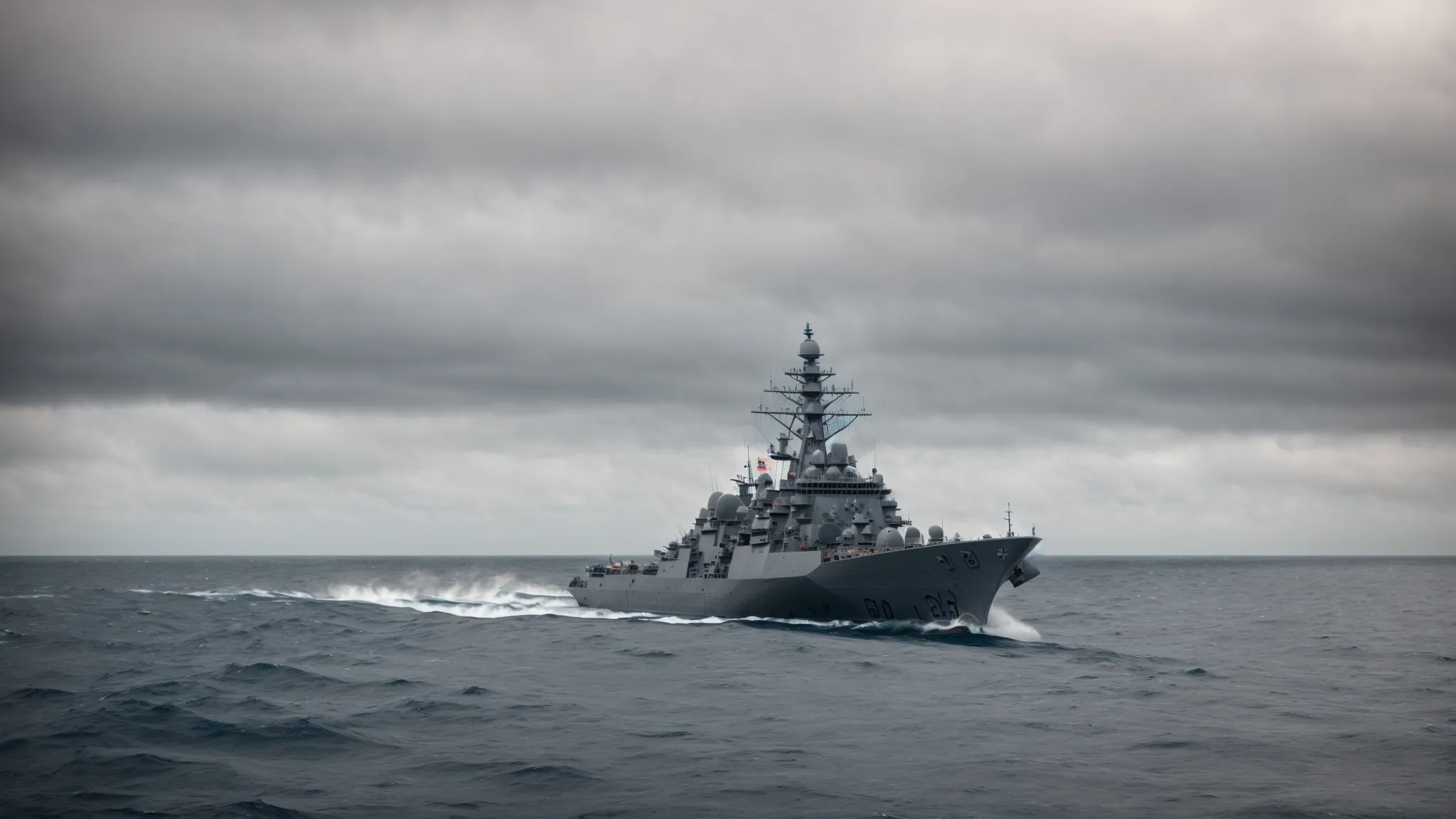
The array of Houthis maritime attacks underscores not only a crisis in maritime security but also poses intricate legal challenges within the confines of international law.
At the heart of this quandary lie blatant violations of the United Nations Convention on the Law of the Sea (UNCLOS) and the World Trade Organization (WTO), prompting a flurry of legal activity as shipping companies seek justice and redress.
This labyrinthine situation has drawn naval coalitions and security patrols into the fray, necessitating a blend of force and diplomacy to restore order on the high seas.
The pressing concerns surrounding this issue serve as a testament to the vital role of entrenched legal frameworks and the collaborative efforts of maritime powers in navigating the tumultuous waters of maritime security and legal governance. The involvement of lawyers and law firms is crucial in addressing issues related to international trade, tariffs, investment, customs, tax, policy, trade agreements, intellectual property, market access, and more.
Violations of the United Nations Convention on the Law of the Sea
The Houthi attacks targeting maritime navigation not only disrupt global trade but also signify a brazen affront to the United Nations Convention on the Law of the Sea (UNCLOS), an internationally recognized treaty demarcating the legal protocol for maritime activities. These infringements tread upon the principles of peaceful navigation and sovereign immunity of ships, cornerstones of UNCLOS that the international community has long upheld.
Such contraventions bring to light the challenges faced by the global maritime regulatory framework, exposing gaps in enforcement against state and non-state actors alike. The international community’s response, pivoting on adherence to UNCLOS provisions and the principles of the World Trade Organization, remains key to averting further erosion of the treaty’s authority and preventing the spiraling of malefactions in critical maritime zones.
Legal Recourse for Affected Shipping Companies
Affected shipping companies confront a daunting legal maze following hostile maritime incidents. With each Houthi attack creating untold financial and operational havoc, these companies turn to the international legal order, seeking restitution and reparation under the framework of international law, maritime conventions, and, particularly, the UNCLOS treaty. The viability of their quests for justice is heavily contingent upon the diligent application of legislation by sovereign nations and the collective will of international bodies to enforce legal norms. They also consider trade agreements and market access, such as free trade agreements and goods import, to protect their goods and intellectual property imports.
Armed with contractual rights and insurance claims, these entities often use specialized law firm services to navigate maritime law’s complexities. Consulting with esteemed legal experts, shipping companies endeavor to file complaints and litigate against the perpetrators or relevant authorities, aiming to rebuild their damaged enterprises and set precedents that strengthen maritime legal protections. This legal recourse represents a pathway to financial recovery and a critical step in deterring future disruptions to international trade.
Can International Arbitration Proceeding Help? If so, How and Against Who?
International arbitration may be a viable option for shipping companies seeking resolution in cases of piracy attacks. With the rise of modern piracy, many countries have signed bilateral and multilateral investment treaties to protect their investors and businesses abroad. Yemen is no exception, as it has signed various treaties with other nations, including:
– The Arab Investment Agreement (1996)
– The Economic Cooperation Agreement between the Republic of Yemen and Malaysia (2001)
– The Investment Agreement between the Republic of Yemen and China (2003)
– The Investment Protection Agreement between the Government of Yemen and Italy (2004)
– The Convention on Recognition and Enforcement of Foreign Arbitral Awards (1958)
These treaties provide mechanisms for settling disputes through international arbitration instead of resorting to the domestic courts of the host country. This is particularly beneficial for businesses operating in Yemen, as it provides a neutral and fair venue for resolving any disputes with local entities.
In addition to these treaties, Yemen has also implemented laws and regulations to protect foreign investors. The Foreign Investment Law (2002) allows for full foreign ownership of businesses in most sectors and provides incentives such as tax exemptions and land leases for up to 99 years. The law also guarantees the right to transfer profits and capital outside of the country without restrictions.
Furthermore, Yemen is a member of the World Trade Organization (WTO), which promotes free trade among its member countries. This allows businesses in Yemen access to larger markets and reduces trade barriers that may hinder their operations. You can see below some of the bilateral investment treaties that Yemen is currently in:
| 1 | Czech Republic – Yemen BIT (2008) | In force | Czechia | 20/03/2008 | 02/07/2009 | Full text: en | cs |
|---|---|---|---|---|---|---|
| 2 | Spain – Yemen BIT (2008) | Signed (not in force) | Spain | 29/01/2008 | Full text: es | |
| 3 | Germany – Yemen BIT (2005) | In force | Germany | 02/03/2005 | 28/03/2008 | Full text: en | de |
| 4 | Italy – Yemen BIT (2004) | In force | Italy | 25/11/2004 | 03/05/2008 | Full text: en | it |
| 5 | Hungary – Yemen BIT (2004) | In force | Hungary | 18/01/2004 | 09/04/2006 | Full text: en |
| 6 | Belarus – Yemen BIT (2003) | Signed (not in force) | Belarus | 18/07/2003 | Full text: ar | ru | en | |
| 7 | Austria – Yemen BIT (2002) | In force | Austria | 30/05/2003 | 01/07/2004 | Full text: en | de |
| 8 | South Africa – Yemen BIT (2002) | Signed (not in force) | South Africa | 28/01/2003 | Full text: en | ar | |
| 9 | Bahrain – Yemen BIT (2002) | In force | Bahrain | 28/12/2002 | 14/07/2004 | Full text: ar |
| 10 | Russian Federation – Yemen BIT (2002) | In force | Russian Federation | 17/12/2002 | 21/07/2005 | Full text: ru | en |
| 11 | India – Yemen BIT (2002) | Terminated | India | 01/10/2002 | 10/02/2004 | Full text: en |
| 12 | Bulgaria – Yemen BIT (2002) | In force | Bulgaria | 12/04/2002 | 11/04/2003 | Full text: bg |
| 13 | Morocco – Yemen BIT (2001) | Signed (not in force) | Morocco | 24/02/2001 | Full text: ar | |
| 14 | Kuwait – Yemen BIT (2001) | Signed (not in force) | Kuwait | 20/02/2001 | Full text: ar | |
| 15 | Ukraine – Yemen BIT (2001) | Signed (not in force) | Ukraine | 19/02/2001 | Full text: en | uk | ar | |
| 16 | United Arab Emirates – Yemen BIT (2001) | In force | United Arab Emirates | 13/02/2001 | 25/08/2001 | Full text: ar |
| 17 | Turkey – Yemen BIT (2000) | In force | Türkiye | 07/09/2000 | 31/03/2011 | Full text: en | tr |
| 18 | Qatar – Yemen BIT (2000) | Signed (not in force) | Qatar | 07/08/2000 | ||
| 19 | BLEU (Belgium-Luxembourg Economic Union) – Yemen BIT (2000) | In force | BLEU (Belgium-Luxembourg Economic Union) | 03/02/2000 | 31/12/2003 | Full text: fr |
| 20 | Lebanon – Yemen BIT (1999) | In force | Lebanon | 25/11/1999 | 13/05/2002 | Full text: ar |
| 21 | Algeria – Yemen BIT (1999) | Signed (not in force) | Algeria | 25/11/1999 | Full text: fr | |
| 22 | Sudan – Yemen BIT (1999) | Signed (not in force) | Sudan | 10/08/1999 | ||
| 23 | Pakistan – Yemen BIT (1999) | Signed (not in force) | Pakistan | 11/05/1999 | Full text: en | |
| 24 | Ethiopia – Yemen BIT (1999) | In force | Ethiopia | 15/04/1999 | 15/04/2000 | Full text: en |
| 25 | Oman – Yemen BIT (1998) | In force | Oman | 20/09/1998 | 01/04/2000 | |
| 26 | Tunisia – Yemen BIT (1998) | Signed (not in force) | Tunisia | 08/03/1998 | Full text: ar | |
| 27 | Indonesia – Yemen BIT (1998) | Signed (not in force) | Indonesia | 20/02/1998 | Full text: en | |
| 28 | China – Yemen BIT (1998) | In force | China | 16/02/1998 | 10/04/2002 | Full text: zh |
| 29 | Malaysia – Yemen BIT (1998) | In force | Malaysia | 11/02/1998 | 04/01/2002 | Full text: en |
| 30 | Morocco – Yemen BIT (1997) | Signed (not in force) | Morocco | 24/02/1997 | Full text: ar | |
| 31 | Syrian Arab Republic – Yemen BIT (1996) | In force | Syrian Arab Republic | 09/10/1996 | 22/07/2005 | |
| 32 | Egypt – Yemen BIT (1996) | In force | Egypt | 06/06/1996 | 10/04/1998 | Full text: ar |
| 33 | Jordan – Yemen BIT (1996) | In force | Jordan | 08/05/1996 | 28/01/1998 | Full text: en | ar |
| 34 | Iran, Islamic Republic of – Yemen BIT (1996) | In force | Iran, Islamic Republic of | 29/02/1996 | 16/10/2000 | Full text: en |
| 35 | Egypt – Yemen BIT (1988) | Terminated | Egypt | 19/10/1988 | 03/03/1990 | |
| 36 | Netherlands – Yemen BIT (1985) | In force | Netherlands | 18/03/1985 | 01/09/1986 | Full text: en | nl |
| 37 | France – Yemen BIT (1984) | In force | France | 27/04/1984 | 19/07/1991 | Full text: fr |
| 38 | Sweden – Yemen BIT (1983) | In force | Sweden | 29/10/1983 | 23/02/1984 | Full text: en |
| 39 | United Kingdom – Yemen BIT (1982) | In force | United Kingdom | 25/02/1982 | 11/11/1983 | Full text: en |
| 40 | Germany – Yemen BIT (1974) | Terminated | Germany | 21/06/1974 | 19/12/1978 | Full text: en |
See International Investment Agreements Navigator | UNCTAD Investment Policy Hub
Through the provision of an ISDS (Investor-State Dispute Settlement) proceeding, the respected tribunal presents a potential case where Yemen may have violated its state responsibility to provide sufficient protection for shipping companies. This breach relates to the issue of inadequate protection offered by Yemen in terms of safeguarding the interests and well-being of these shipping entities. It is important to delve into this situation’s intricacies and understand its implications on international trade, the shipping industry, and globalization.
The ISDS proceeding allows for resolving disputes between investors and states, offering a platform to address the alleged breach of state responsibility. In this case, the focus lies on protecting shipping companies operating within Yemen’s jurisdiction. These companies rely on adequate protection and support from the government to carry out their operations smoothly and without unnecessary disruption or risks.
However, it can be alleged that Yemen has failed to fulfill its responsibility to ensure this protection and has breached its state obligation. This breach can have severe consequences for the shipping industry, causing financial losses and potential harm to the reputation of these companies. Through the ISDS proceeding, the respected tre aims to examine the evidence and arguments presented to determine the validity of the claim and, if found in favor of the shipping companies, provide a suitable remedy for the breach. The bilateral investment treaty highlights the importance of foreign trade companies.
Furthermore, there can also be allegations of expropriation of the ships detained by the Houthis rebels due to the inaction or complete failure of Yemen to act. This violates the shipping companies’ rights and goes against international law and principles of fair treatment and non-discrimination. If this expropriation is found to be true by the trusted tribunal, it could have a significant impact on Yemen’s relations with other countries and may even lead to economic sanctions or other diplomatic measures.
In addition to potential international law violations, there are concerns about the safety and well-being of crew members aboard these detained ships. The ISDS proceeding wil consider any evidence regarding mistreatment or human rights abuses towards these individuals during their detention. If such actions are proven, it will further strengthen the case against Yemen for breaching its state obligations. The bilateral trade gains from the Trade Act of 1974 can also play a role in this scenario.
In addition to protecting shipping companies from direct attacks, Yemen is responsible for providing adequate measures against piracy and other criminal activities that threaten maritime trade. This includes providing a stable and secure port environment and collaborating with international organizations such as the World Trade Organization and neighboring countries to combat piracy effectively.
In conclusion, the allegation of Yemen breaching its state responsibility for offering adequate protection to shipping companies presents a significant matter in the realm of international trade. The ISDS proceeding provided by the respected tre serves as a platform to address this issue and potentially rectify any harm caused.
The Role of Naval Coalitions and Security Patrols
In the labyrinth of maritime security, naval coalitions serve as watchdogs patrolling the deep blue; their role has gained increased prominence following the uptick in Houthi attacks. These coalitions execute precision in their patrols and maneuvers, harnessing collective military prowess to safeguard commercial shipping lanes, a bulwark ensuring that the arteries of international trade remain unobstructed.
Security patrols operate as a deterrent, their vigilant presence a signal to marauding actors of the international community’s resolve to maintain open seas and defend the rule of law on international waters. Through coordinated operations and strategic presence, they reinforce the overarching framework of maritime law, contributing significantly to the stability of global trade amidst contemporary security challenges.
Mitigation Strategies and International Cooperation

The incessant Houthi maritime attacks have precipitated a vigorous international dialogue on the reinforcement of maritime security measures and the tightening of the collaborative fabric among nations. The United States International Trade Commission has been at the forefront of promoting bilateral trade agreements for goods, imports, and exports, as well as addressing tariff issues and policies related to intellectual property and market access. The European Union also actively fosters free trade agreements and promotes globalization.
This conversation is driven by an imperative to bolster surveillance systems and intelligence capabilities, thereby enhancing the safety of sea lanes and reducing the vulnerabilities currently being exploited. The United States International Trade Commission plays a significant role in shaping trade policy, including tariffs, trade agreements, intellectual property, market access, and the regulation of goods, imports, exports, and foreign direct investment.
In parallel, there is a tacit recognition that durable solutions may lie beyond mere military fortifications, necessitating an exploration into the realm of diplomatic engagements aimed at quelling the sources of conflict. The United States International Trade Commission plays a crucial role in trade policy, including tariffs, exports, customs, and tax regulations. The World Trade Organization also promotes free trade and addresses trade barrier s.
Furthermore, regional security initiatives are escalating in importance as they offer tailored responses to the unique challenges faced in each affected maritime area.
Collectively, these approaches represent a multifaceted strategy poised to restore order to the maritime domain whilst safeguarding the uninterrupted flow of commerce that fuels the global economy.
Strengthening Maritime Surveillance and Intelligence
Enhanced maritime surveillance and intelligence represent the bedrock upon which the global maritime community plans to thwart Houthi aggression at sea. Such measures encompass the advancement of technologies, including satellite imagery, unmanned vehicles, and real-time monitoring systems, enabling stakeholders to anticipate threats and secure trade vessels traversing high-risk areas.
International cooperation fortifies these efforts, as nations and industry leaders share critical intelligence and best practices. This collective endeavor is integral to maintaining a robust defense against maritime disruptions, ensuring that shipping lanes are closely monitored and protected from escalating threats. The United Nations Conference on Trade and Development plays a key role in promoting global trade and fostering economic growth.
Possible Diplomatic Solutions to Mitigate Risks
In the theater of maritime security, where the high seas are as much about diplomacy as they are about navigation, the deployment of sophisticated diplomatic measures emerges as a pivotal strategy to defuse the Houthi threat. Governments and international bodies are increasingly leaning toward negotiation and conflict resolution to address underlying political tensions that contribute to the disruption of sea lanes.
Such diplomatic engagement involves leveraging the influence of regional power brokers and fostering dialogue between the Houthi rebels and international actors to reduce hostilities. The objective is clear: to create a sustainable framework of peace that undergirds maritime safety and, by extension, safeguards the uninterrupted channels of global trade. The United States International Trade Commission plays a crucial role in shaping trade policy and ensuring compliance with trade agreements.
Enhancing Regional Security Initiatives
Regional security initiatives have emerged as vital components in the strategic chessboard of maritime defense, particularly in light of the complex dynamics that characterize the maritime threats posed by Houthi forces. These localized efforts leverage the specific expertise and vested interests of regional actors to formulate a dynamic response tailored to counter and deter aggression in their proximate maritime zones. The European Union plays a significant role in promoting trade agreements and ensuring the smooth import and export of goods among developed countries, contributing to the overall globalization and world economy.
The investment in regional coalitions and the establishment of joint operational protocols signify a growing recognition of the synergistic power that such alliances wield. By combining resources and intelligence, these regional endeavors are fortifying the security infrastructure against current threats and pioneering pathways for future collaborations to safeguard international shipping routes.
Future Prospects for Maritime Security in Houthi-Targeted Regions
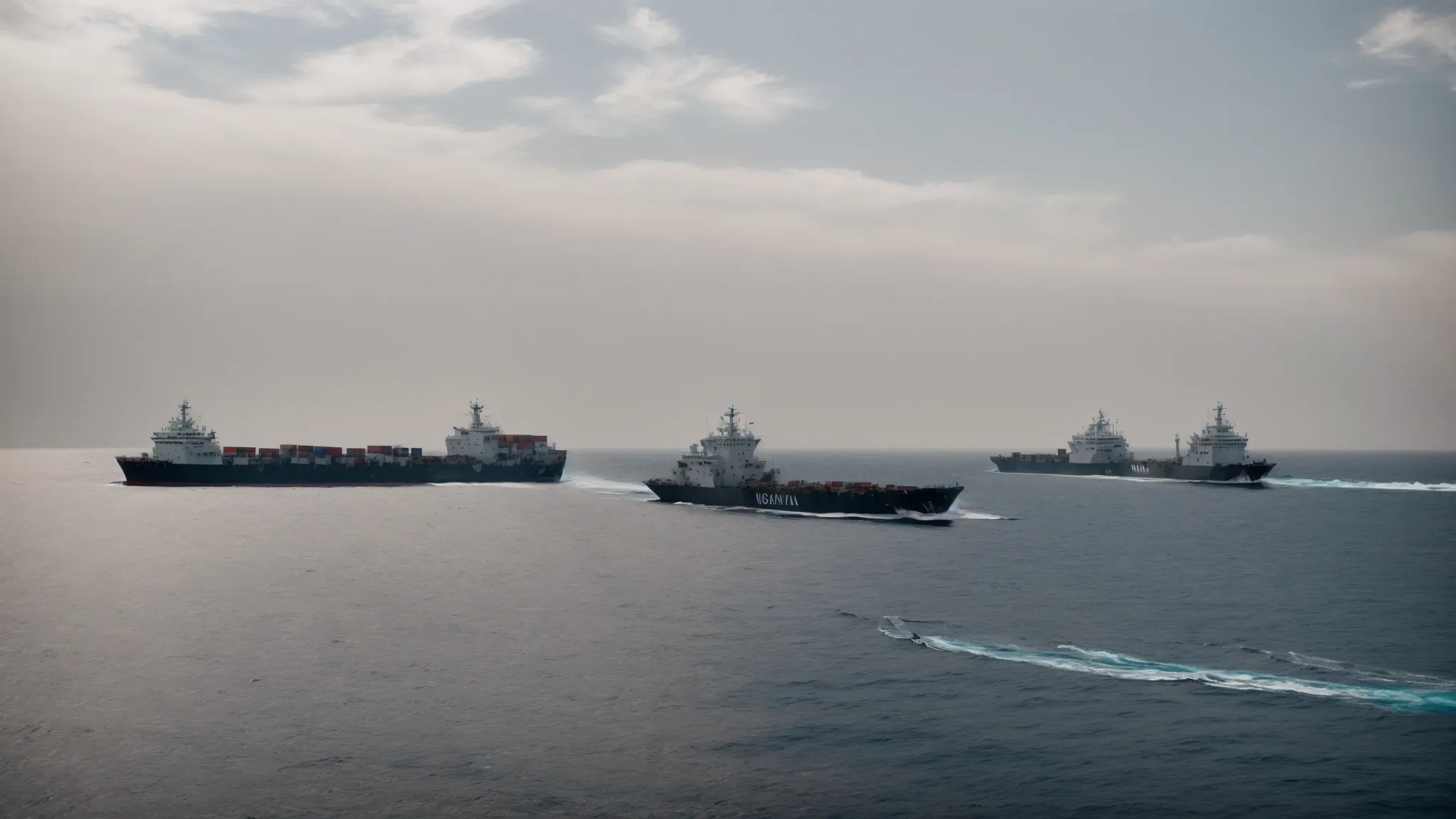
The waters once traversed by ancient mariners now teem with a security quagmire, as Houthi insurgents sow unrest within critical maritime regions.
Industry analysts and defense strategists alike turn their gaze upon the burgeoning trend of piracy and terrorism that straddles the nexus of maritime security and international trade.
The analytical spotlight intensifies on the Red Sea—a region rife with geopolitical volatility, affecting its role as a conduit for commerce.
Probing the robustness of trade routes demands utmost attention, as does the development of innovative security measures destined to shield the shipping industry against a repeat of such maritime encroachments.
The horizon for the maritime domain is marked by the commitment to preempt transgressions and preserve the uninterrupted flow of global trade, each initiative underpinning the collective pursuit of sustainable peace and prosperity on the high seas.
Predicting Trends in Maritime Piracy and Terrorism
Amid the labyrinth of maritime geopolitics, the trend lines for piracy and terrorism are drawn with an increasing focus on the chokepoints of commerce, such as the Red Sea and the Bab el-Mandeb Strait. The frequency and sophistication of Houthi attacks suggest a rising tide of piracy and an emboldened approach to terrorism at sea, mandating a vigilant and adaptive maritime security posture.
The maritime community grapples with the daunting task of forecasting the trajectory of maritime threats, acknowledging that the strategic implications of Houthi actions extend beyond mere harassment of shipping lanes. As these non-state actors continuously refine their tactics and target vital conduits of international trade, maritime security strategies must evolve with equal intention and intelligence, taking into account policies related to trade agreements such as the Transatlantic Trade and Investment Partnership and the impact on import and export, tariff s, and foreign direct investment:
| Maritime Threat | Chokepoint | Trend | Response Strategy |
|---|---|---|---|
| Houthi Piracy and Terrorism | Bab el-Mandeb Strait & Red Sea | Rising frequency and sophistication | Enhanced surveillance and deterrence |
| International Impact | Global Trade Routes | Wider geopolitical repercussions | Collaborative regional security initiatives |
Assessing the Stability of Trade Routes in the Red Sea
The Red Sea, enshrined as a crucial maritime artery, hosts a procession of vessels that carry the lifeblood of international commerce. Assessing the stability of its trade routes post-Houthi incursions has become vital, as any perturbation within this region could have a cascading impact on the flow of goods and energy resources vital to an array of economies. The United Nations Conference on Trade and Development plays a key role in monitoring and promoting trade in this region.
Quantitative analysis and vigilant monitoring of maritime activity in the Red Sea are now paramount to ensuring navigational confidence and mitigating risk. The adoption of targeted safety measures and continuous surveillance along this essential conduit underscores the collective commitment to preserve its role as a steadfast channel for trade:
- Enhanced risk assessment procedures for commercial shipping.
- Deployment of resilient communication networks for real-time alerts.
- Strategic placement of international naval forces to deter potential threats.
Measures to Prevent Future Security Breaches in the Shipping Industry
To fortify maritime trade against Houthi insurgent threats, the shipping industry must invest in cutting-edge security technologies. These include integrating advanced tracking systems and AI-driven anomaly detection tools that can swiftly identify and respond to unlawful activities at sea. International trade is crucial for economic growth and market access.
Collaboration between the public and private sectors is essential in crafting legislature to tighten security protocols for vessels in high-risk regions. Proactive international agreements can enhance cooperative surveillance measures and expedite the sharing of critical security intelligence, forming an impenetrable shield against future breaches. Trade agreements play a crucial role in fostering such collaboration and strengthening market access for goods.
Navigating Legal Challenges of Houthi Maritime Aggression
The spate of Houthi maritime attacks has significantly disrupted global trade by targeting vital shipping lanes and posing profound security, legal, and economic challenges.
By breaching international maritime law, specifically UNCLOS, these actions threaten the stability of the Red Sea trade route, a critical vein for world commerce.
The fallout extends to heightened insurance and shipping costs and necessitates diversions and delays in trade routes, which hamper global supply chains and affect various sectors, from energy to agricultural commodities, leading to worldwide economic implications. The World Trade Organization and trade agreements facilitate international trade and reduce trade barriers.
In response, international actors have mobilized to bolster maritime vigilance and secure navigation, with naval coalitions and security patrols playing key roles in maintaining open seas.
Furthermore, there’s a pressing need for enhanced regional security initiatives and international cooperation in surveillance, intelligence, and diplomatic engagement to address the root causes and reduce the risk of future attacks. The United States International Trade Commission plays a crucial role in shaping trade policy and ensuring fair competition. The general agreement on tariffs and trade is also an important factor in international commerce.
The global maritime community recognizes the urgency of upgrading security measures, integrating advanced technology, and establishing stronger legal frameworks to safeguard against such aggressions with the United Nations Conference on Trade and Development support.
It’s evident that preserving the integrity of maritime trade routes and adhering to legal norms is essential for the immediate protection of vessels and sustaining the long-term stability of international trade. The United Nations Conference on Trade and Development plays a crucial role in promoting fair trade and economic growth.
At Transnational Matters, we understand the intricacies of International Trade and Piracy. Our team of experts is dedicated to providing the best solutions for your business needs. We are committed to helping you navigate through the complex world of international trade and represent shipping companies in Arbitration against those responsible. Contact us Today

